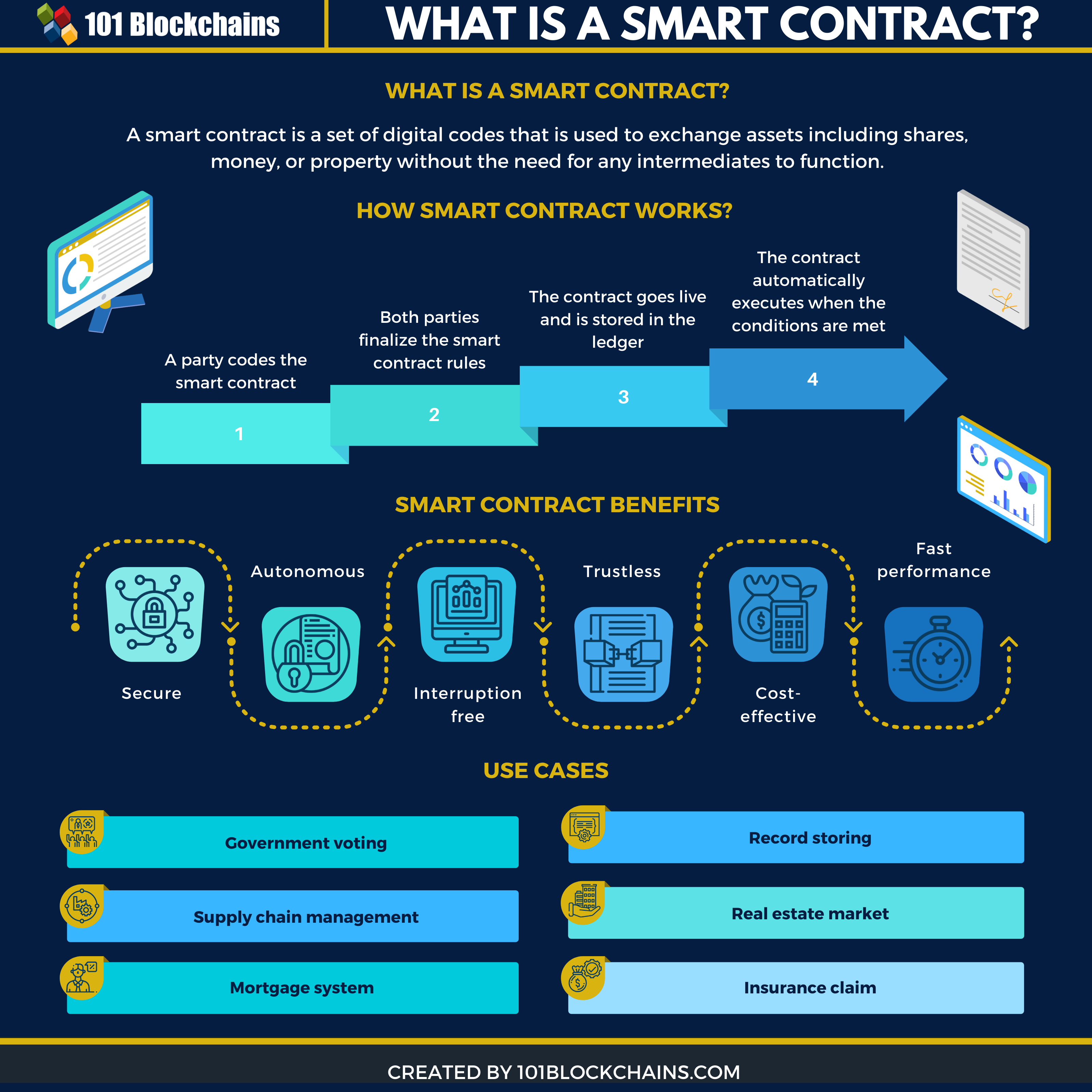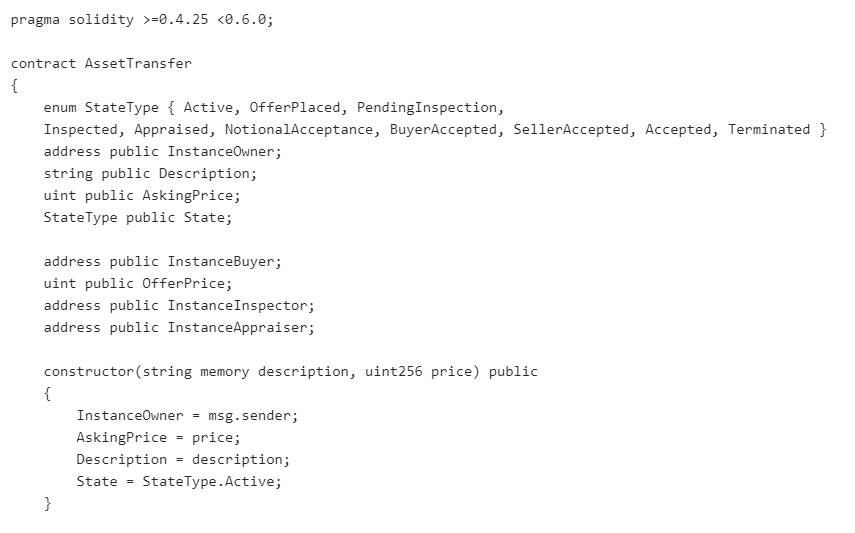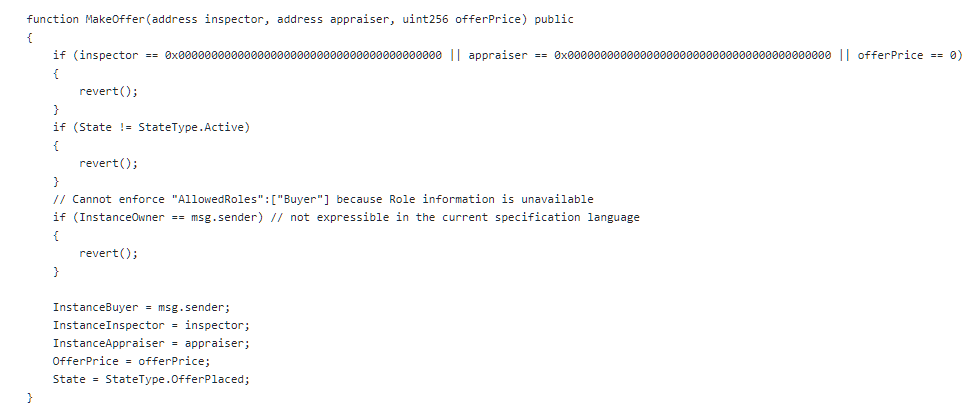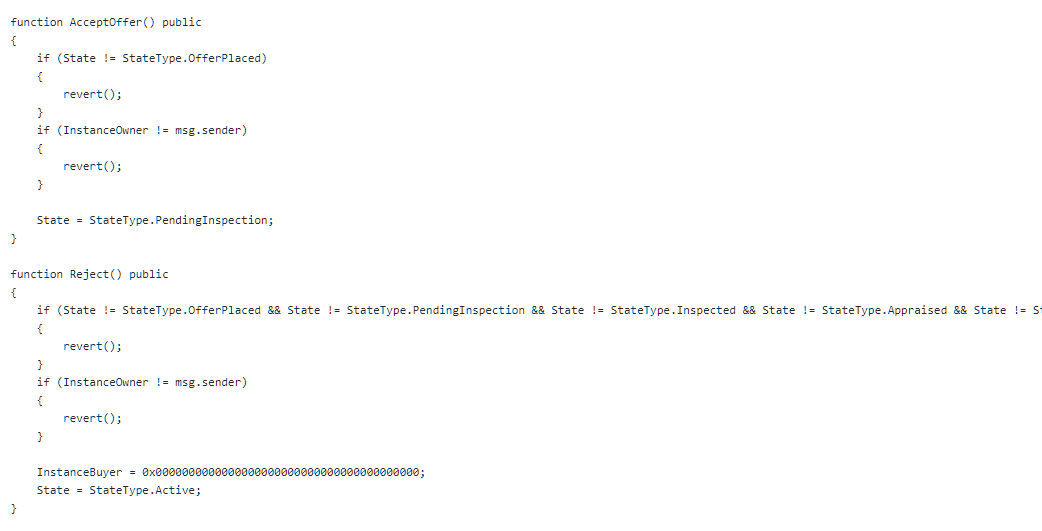Learn how blockchain truly works, master key definitions, and uncover what makes smart contracts so "smart." Dive into the fundamentals, gain valuable insights, and start your blockchain journey today!

- Reviews
101 Blockchains
- on September 09, 2021
What Is A Smart Contract? A Complete Guide
Have you ever wondered, “What is a smart contract?” If you do, then you have come to the right place as we will list a complete guide on smart contracts.
In any industry, automation is a necessity as businesses are now looking to maximize profits by keeping expenses as low as possible. Another reason enterprises want automation is to remove human error and make the process as smooth as possible.
Clearly, there are many technologies that enable companies to do just that. Blockchain technology is one of the technologies that offer automation as one of the core features. Smart contracts are used to achieve automation. They are at the core of automation.
To learn more about it, let’s learn the smart contact definition.
Curious to understand the complete smart contract development lifecycle? Join Yearly/Yearly+ Plan and get free access to the Smart Contracts Development Course Now!
What is a Smart Contract?

Please include attribution to 101blockchains.com with this graphic. <a href='https://101blockchains.com/blockchain-infographics/'> <img src='https://101blockchains.com/wp-content/uploads/2020/08/what-is-a-smart-contract-1.png' alt='what is a smart contract='0' /> </a>
A smart contract is a digital code used to exchange assets including shares, money, or property without the need for any intermediates.
In technical terms, it is an automated or self-executing contract that holds the agreement between two parties embedded using code. The smart contract is distributed, decentralized, and transparent as it runs on blockchain technology.
The lack of middleman makes it an amazing concept as it can function automatically. The best comparison to this in the real world would be the documents provided by lawyers.
Smart contracts’ ability to embed the rules, both positive and negative, is very useful in almost every setting.
Build your identity as a certified blockchain expert with 101 Blockchains’ Blockchain Certifications designed to provide enhanced career prospects.
The Road To Smart Contract Concept
The idea of the smart contract is not new. Infact, the idea of the smart contract was first proposed by Nick Szabo two decades ago.
According to him, smart contracts are “a set of promises that are specified in digital form.” Nick Szabo is a computer scientist and cryptographer. Therefore. he worked on two key topics: digital currency and digital contracts.
With his work, the concept of smart contracts is established where he aimed to bring the concept to improve high evolved contract law practices for internet users. Electronic commerce can utilize the design and implement it.
The concept evolved over the years, but its true implementation was first seen when blockchain came into existence. Bitcoin when released did come with the support for smart contracts, but let only create and execute simple smart contracts. It was ethereum that cemented the use of smart contracts in real-world use cases.
Vitalik Buterin is the founder of Ethereum. This leads us to a very interesting question of who invented smart contracts?
Want to become a bitcoin expert? Enroll Now: Getting Started with Bitcoin Technology
Who invented smart contracts?
Nick Szabo invented the concept of smart contracts. His work was surrounding it and cryptography. He is an American computer scientist.
In 1998, he worked on Bit Gold, a cryptocurrency. Bit Gold defined smart contracts as computerized transaction protocol which can be defined via contract for execution purposes.
Many confuse Vitalk Buterin s the founder of smart contracts concept, but that’s not true.
But, he did introduce an optimal way of using smart contracts in blockchain technology.
Want to become a Cryptocurrency expert? Enroll Now in Cryptocurrency Fundamentals Course
What Is A Smart Contract? Blockchain’s Smart Contract
Now that we know about the smart contract’s origin, it is time to look at blockchain-based smart contracts.
Satoshi Nakamoto in 2008 released the first cryptocurrency, bitcoin. At the core, it utilized the groundbreaking blockchain technology.
Bitcoin protocol can be only used to create simple smart contracts. But, there were many teams across the world who worked on the technology and introduced smart contracts in Bitcoin. One such team comes from Particl.io, an eCommerce platform utilizing blockchain at its core. They enabled an intelligent smart contract on Bitcoin which takes care of the funds stored in the trustless escrow.
Another group also succeeded in making efficient smart contract work on the bitcoin network. They released a framework FASTKITTN which solved the problem of complex smart contract management in bitcoin.
It also solved the cost associated with running smart contracts on the bitcoin network. They discussed the whole process of doing so in their research paper, Practical Smart Contacts on Bitcoin.
To solve the problems, they utilized the trusted computing environments(TEEs). Furthermore, there they managed to run the smart contract off-chain which resulted in an efficient way to execute smart contracts with complete security.
Ethereum Smart Contract
Ethereum changed how smart contracts worked in a blockchain environment. ETH was designed with smart contracts in mind. And, that’s why smart contracts are efficient in the ethereum ecosystem.
Right now, ethereum is the number one choice for creating smart contracts.
Want to learn the fundamentals of Ethereum development? Enroll Now: Ethereum Development Fundamentals
How Smart Contract Works?
In this section, we will take a closer look at smart contracts.
Vitalik Buterin in a DC Blockchain Summit described smart contracts as a way to transfer assets or currency in a program. He also added that the program executes the code based on the conditions defined in it. It does it automatically and verifies the information based on the information it gets.
The smart contract executes when the condition is met.
If the condition doesn’t meet, then the smart contract will execute based on the condition provided.
One more important thing that he mentioned is that a decentralized ledger makes copies of the smart contract or document to establish immutability and security.
What he described might be too technical for someone new to the concept. That’s why let’s go through an example below.
Smart Contract Example
Real estate is adopting blockchain. If you in the distant future decide to buy real estate using a blockchain-powered platform, then you can see smart contracts in action.
So, you saw a property and decided to buy it.
There are many parameters that need to be taken care of during a real-estate deal. For example, you need to set loan amounts, installment time, and other unique conditions.
To set off the smart contract, you need to sign the smart contract and set it in motion.
For instance, you decided to pay an upfront 20% of the real-estate value. After that, you decided to pay the rest of the real-estate value in installments and other conditions that you might have.
The seller creates a smart contract based on the discussed conditions. The smart contract is set in motion, once both of you decide that everything is documented correctly.
With time, you will pay the installments, and this will be recorded by the smart contract.
The property ownership is transferred to you once all the payment is transferred to the seller. Everything is done automatically without the intervention of any intermediaries or parties.
In comparison to a real-estate deal done through a traditional method, you will be able to save time and effort in completing the whole deal.
Both buyer and seller save money as there are no intermediaries.
Also, the smart contract will notify all the associated parties once an event occurs in the smart contract, which includes, banks, buyers, sellers, and the insurer.
Want to know the real-world examples of smart contracts and understand how you can use it for your business? Check the presentation Now on Examples Of Smart Contracts
A Technical Example of Smart Contract
After reading all of these, you must be excited about the possibilities associated with smart contracts. More so, to better understand what smart contracts can do and achieve, let’s take a look at the ethereum-powered smart contract.
Azure has provided a good collection of samples on their GitHub page. As we discussed asset transfer or ownership transfer above, let’s take a look at their asset-transfer example. You can find it here.
To ensure proper handling of high-quality assets, it is important to include two more players apart from the buyer and seller: Appraiser and Inspector. The inspector is responsible for inspecting the assets before the buyer makes a purchase.
The appraiser is from the seller side. He makes assets considerable to buyers. He also facilitates the sale for the seller.
To get a better understanding, let’s take a look at the image below.

Source: Azure GitHub Sample Page
It also contains multiple states to define the smart contract condition. Currently, the smart contract that we are going to discuss include 10 states including
- Active
- Offer placed
- Pending inspection
- Inspected
- Appraised
- Notional acceptance
- Seller accepted
- Accepted
- Terminated
The workflow is complex and that’s why we are not going to discuss it here. However, you can check out the readme.md file for the asset-transfer repository.
But, how does the smart contract look?
Let’s take a look below:

The above 23 lines of code are the beginning code for the AssetTransfer Contract. It initiates the key variables within the contract and then also puts in the constructor for initializing the variables.
Apart from the above function, there is another important function, MakeOffer and Accept Offer.
Let’s take a look at both the functions below.

The offer is made here. Now take a look at the AcceptOffer and Reject function below.

Each function has its own purpose. In most cases, the function denotes the smart contract states.
The whole contract is 218 lines long with different functions such as MarkInspected, MarkAppraised, and so on!
Want to learn more about The Ethereum Technology? Enroll Now: The Complete Ethereum Technology Course
Smart Contract Benefits
By now, you should have a good understanding of smart contracts and how it works. In this section, we will take a look at the smart contract benefits and what it has to offer as a whole.
Secure
Smart contracts provide a secure environment for executing the contracts. This protects the contract details and other key information from leaking. Moreover, the smart contract execution is also not affected by any third-party or humans, making them hacker-free. To ensure security, all the critical information is secured via cryptography.
Autonomous
Smart contracts are autonomous which brings its functionality to a whole new level. Once the smart contracts are deployed, they can execute and complete themselves without any interference.
Interruption Free
The smart contracts cannot be interrupted by any third-party if it is not designed to do so in the first place.
Trustless
The smart contracts provide a trustless environment where all the party’s interests are protected.
Cost-Effective
Smart contracts are cost-effective as they are autonomous and don’t require any intermediary.
Fast Performance
Smart contracts are fast! A contract can execute in a matter of minutes compared to hours when it comes to real-world document-based contracts.
Smart Contract Problems and Challenges
Just like any other technology, smart contracts are not free from problems and challenges. In reality, the market is evolving, and there many companies looking for ways to adopt blockchain technology. Infact, smart contract adoption is hampered by the fact that blockchain technology is not mature.
Yes, blockchain technology is still in its nascent stage.
The main challenges that plague the world of smart contracts include the following:
-
Adoption Curve:
Blockchain being a nascent stage also impacts the adoption of smart contracts. Also, businesses need to overcome a lot of challenges for implementing smart contracts as they first need a decentralized ledger-based network.
-
Legal and regulations:
Any smart contract application needs to follow the regulations based on the ecosystem and the place where it needs to be executed.
-
Not standardized:
Smart contracts are still not standardized with multiple approaches and solutions available online.
-
Learning curve:
Blockchain and smart contracts are not easy to master. Thus, the developer needs to not only have the aptitude to code but also understand the law side of the code he is writing for the contract. Apart from that, the judges and the law agencies should be able to understand the code either by themselves or through interpretations.
-
Business ecosystem complexity:
Smart contracts are not adhocs that can be added to the system. That makes it not possible to add or execute, specifically in a complex business ecosystem.
-
Data privacy:
Blockchain is immutable. That’s not in favor of the data privacy laws that are set by the different geographical reasons across the world. For insurance, GDPR is about enabling the user to make the system forget then. Currently, work is still going to make blockchain as flexible as possible without losing its key points.
Apart from that, there is a competition that stops smart contracts from becoming viable. Parties struggle to decide the middle point and affect the whole process. Lastly, there are people’s expectations which can lead to problems as blockchain or the other related technologies are just not mature or popular enough in the market. It still requires a good amount of time before it gets accepted.
Not sure how to build a career in enterprise blockchains? Enroll Now: How to Build Your Career in Enterprise Blockchains
DAML – Open-source for smart contracts
In the challenges, we talked about the lack of standardization. DAML tries to solve the problem by providing a language for smart contracts. Thus, it lets developers create amazing full-stack distributed applications for blockchain, DLT, and even databases.
So, what makes DAML so special in the first place? Well, it is easy, efficient, and safe to use. The ecosystem is rich and comes with DAML IDE, DAML Sandbox, DAML Assistant, and other forms of integrations.
At the core, you will find the language itself. It supports some key features that we are going to list below:
- DAML model: It is a powerful type system that makes it easy to define and present complex data schemes for domain-driven design
- Fine-grained permissions: You can use DAML to do fine-grained permission by allowing a specific person to a given contract or part of a contract.
- Business logic: DAML is highly configurable enabling businesses to map business logic seamlessly in the distributed applications
- Scenario-based testing: In scenario-based testing, you get full control to test the different aspects of your smart contracts and its functionality.
There are many companies that are actively developing full-stack applications using DAML. These companies include Accenture, ISDAI, Hashed Health, Change HealthCare, and more!
However, the most fascinating thing about DAML is its support for other distributed ledger technologies including Hyperledger Sawtooth, Amazon Aurora, Hyperledger Fabric, VMWare, Corda, and more!
Start your journey to become a smart contract developer or architect with an in-depth overview of smart contract fundamentals, Enroll Now in Smart Contracts Skill Path
Smart Contract Use Cases/ Applications
Smart contracts are versatile in their approach. This means that we have tons of smart contract use cases and applications.
In short, smart contracts can be used in the following scenarios.
- Trading activities
- Records storing
- Supply chain management
- Real estate market
- Mortgage system
- Protecting the copyright
- Insurance claim
DeFI: The Best Smart Contract Use-Cases
Decentralized Finance(DeFi) is an open-source movement for the financial sector, creating an ecosystem where users can rely on distributed applications(dApps) for their financial needs.
It is basically providing financial services through a public and distributed network that is trustless and has more reach compared to Centralized Finance(CeFI).
If you want to read more about it, we recommend checking out our introduction guide here: What is Decentralized Finance (DeFi)? A Short Guide
We have also planned to publish a DeFi Complete Course, so keep checking the space for more information about it.
Want to know more about DeFi? Enroll Now: Introduction to DeFi Course
Conclusion
This leads us to the end of our What is a Smart Contract Complete Guide. We covered a lot of things about smart contracts, and by now, you should have a clear understanding of what smart contracts have to offer.
So, what do you think about smart contracts? Do you think that it will affect your life in some way or another in the future?





